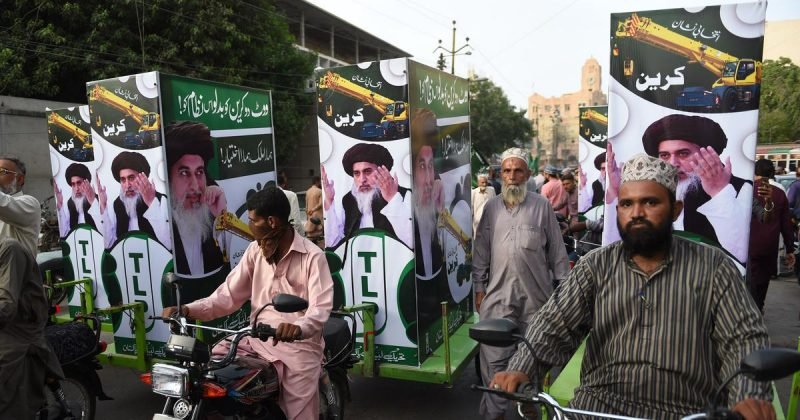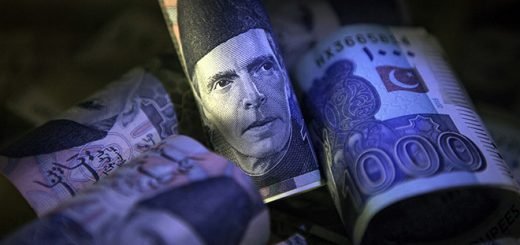Tehreek-e-Labbaik Pakistan: A Case of the Military Losing Control over Islamists

Imran Khan’s government has issued a ban against the Tehreek-e-Labbaik-Pakistan (TLP) far-right Islamist political party under terrorism laws and issued a notification accordingly. This extreme step was taken after TLP’s supporters carried out protests across the country for three days, against the arrest of their chief Saad Hussain Rizvi. The announcement of the ban on April 15, 2021 was made by Minister for Interior Sheikh Rasheed Ahmad, who had on previous occasions heartily supported the Tehreek-i-Labbaik movement. Saad Rizvi’s arrest allegedly for organizing violent anti-French protests, by the politico-military establishment is interesting in its duplicity on several grounds but specifically for the executive’s decision of disbanding the TLP under terrorism laws. The fact is that despite differences in their goals at times, the Islamic parties like the TLP and the military establishment have always cooperated and remained closely allied. No dearth of evidence indicates that the religious far-right has been used by the Pakistani military to legitimize its own control over political power. The ‘Tehreek-e-Labbaik Ya Rasool Allah Pakistan (TLYRAP) movement is no different in its compliant relationship with the Pakistani army. The arrest of Saad Rizvi is a pantomime, conveniently timed ahead of the Financial Action Task Force (FATF) review in June 2021.
Formed in May 2017, the TLP is the political wing of the Tehreek-e-Labbaik Ya Rassol Allah Pakistan (TLYRAP)movement founded by Allama Khadim Hussein Rizvi.Shortly after the death of Khadim Rizvi on November 19, 2020 Hafiz Saad Rizvi, was appointed as his father’s successor. Largely Barelvi in its representation, the ‘Tehreek-i-Labbaik Ya Rasool Allah’ movement witnessed its moment in the aftermath of the acquittal of Asia Bibi, a Christian woman accused under Pakistan’s blasphemy law, an issue which along with shariah law is central to the TLP. Khadim Rizvi demanded that the judgement to be reversed and organized massive protests effectively shutting down the country for days. Previously in 2016, before the hanging of Mumtaz Qadri, the killer of Salman Taseer the Governor of Punjab, Khadim Rizvi organized massive protests demanding his release. In 2017 when news broke out of some minor changes to a sworn oath affirming a politician’s belief in Khatm-i-Nabuwat (the finality of the prophethood) TLP organised a three-week long sit-in at Faizabad, paralysing life in the capital Islamabad. It lifted the siege when then Pakistan Muslim League-Nawaz (PML-N) government fired its law minister. Then opposition leader and present Prime Minster Imran Khan had supported the TLP’s demands as he was trying to topple the PML-N government.

Given Nawaz Shareef’s anti-military stance, the military establishment worked hard to make sure Imran Khan becomes the next Prime Minister in the 2018 general elections. To pressure the then ruling party PML-N, the military staked propping up the Tehreek-e-Labbaik, at that time considered a fringe pressure group. Suddenly the Tehreek-e-Labbaik appeared to be protesting everything from the hanging of Mumtaz Qadri to the acquittal of Asia Bibi. The run-up to 2018 elections witnessed attacks on political meetings, arrests of seasoned and likely-to-win politicians, censorship of the media and kidnapping of activists and journalists known to be critics of the military and crucially, hardline right wing parties entering the fray. The TLP’s rapid rise in the political sphere of Pakistan was a direct outcome of the military establishment’s tacit support to different religious groups in order to weaken the PMLN government.
Throughout Pakistan’s history the establishment’s policy of appeasing the religious groups has only encouraged their irrational demands. In November 2017, when the TLP organized a huge sit-in at Faizabad, demanding the sacking of Federal Law Minister Zahid Hamid over the “softening” of anti-blasphemy laws in the country. For weeks the sit in continued, eventually erupting in violent clashes with police forces. Finally, the army chief intervened and asked “both sides” to show restraint. With the director general of the ISI as one of the guarantors, the Pakistani army eventually brokered a settlement, promising to set free all TLP supporters who had been arrested by the police. This standoff, in which the Islamists emerged victorious, clearly demonstrates that there was overt and covert support for the protestors from the military, despite court orders to have them removed from Faizabad. The settlement accord specifically thanked the army chief for preventing more bloodshed. There was even footage of the Punjab Rangers’ director general himself distributing money among protestors ‘to go home’ after they were released from police custody.

In a subsequent press conference Pakistan Tehreek-e-Insaf (PTI) chairman Imran Khan stated that his party workers were willing to join the TLP Faizabad sit-in as “the matter had left the realm of politics”. Khan said, “The government should know that whenever a question is raised on the finality of prophethood, there’s always a reaction of great proportions because of the religious history attached with the matter.” During the 2018 election campaigning the PTI pandered to the narrative of extremist parties such as the TLP. Current Interior Minister Sheikh Rasheed on a TV show declared that Mumtaz Qadri, had emerged as a political force and how that ‘huge vote bank’ will help Imran Khan.
Khadim Rizvi’s open manifestation of religion helped him become one of the most popular leaders of Barelvi-Sunni Muslims in Pakistan’s Punjab. And Imran Khan’s government is well aware of his popularity. While the establishment has now detained Saad Rizvi, it had made a deal with Khadim Rizvi as recently as November 2020, just a week before his death. Agreeing to discuss TLP’s demands for downgrading diplomatic ties with France over the publication of caricatures of the Prophet Muhammad, the government acceded that Pakistan “will not appoint its ambassador to France” and to the boycott of French goods. His government has successively allowed TLP cadres to create havoc without mounting any effective resistance. This time when the government finally took action, it chose to do so by banning the party. It is yet an instance of extremist groups nurtured by the military going out of control. Of concern is the military’s inability to deal with such groups in the long run. Amir Rana writes, “State institutions have sympathy for all sorts of religious groups, except when they start challenging their turf.”

Because groups like the Tehreek-e-Labbaik despite joining politics, do not relinquish their qualities of essentially being hardline religious movements, the ban may not impact their activities. It can always resort to its agitational tactics of blocking roads and highways across the country and destroying public and private property. Nourished by the state for its vested interests the current “ban will not dilute the narrative that fuels the party, it may even fan it.” The fault lies with the politico-military establishment for allowing and appeasing an ambitious religious group. This direct and indirect patronage of the military to Islamists groups, will continue unabated, because of the lack of a national consensus against groups and the centrality of Islam in Pakistan’s national identity.



















